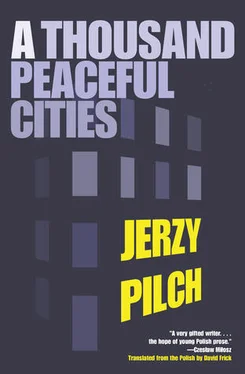“And in that way I came to the conclusion,” someone’s dark, subdued voice was finishing a sad, or perhaps a happy, story, “in that way I came to the conclusion that the only thing I demand from a woman is that she wear a brassiere with style. That’s right. I demand style in the wearing of a brassiere. Nothing else.”
“A proper demand,” a second subdued voice added to the discussion, “a proper demand. After all, this is something no man can do.”
Suppressed giggles resounded, glasses clinked delicately, and the train slowed down.
“I had the misfortune,” someone had clearly succumbed to the spell of Mr. Trąba’s narcotic manner of speaking, although this was certainly not him; the unfamiliar half-whisper sounded too youthful and unstable, “I had the misfortune to start a romance, once upon a time, with a woman with fluent mastery of the pen. I was never keen about people who had fluent mastery of the pen, but my knowledge about the fact that there existed women who had fluent mastery of the pen was highly theoretical. In any event, I had never met a writing woman, to say nothing of one who wrote so ecstatically, so greedily, and — I’m aware that this sounds risqué—who wrote in every situation. She buried me under piles of letters and letterlets, little slips of paper, hundreds of confessions, thousands of notes, occasional poems, and accidental short stories, inspired descriptions of what she did yesterday, and what she would do today. Everywhere I came upon sheets of paper covered with her sprawling handwriting and folded in her characteristically refined manner. Every time I reached into my pocket, I came upon some text. I constantly removed them, and I constantly found them. I removed them not only because I was quite simply afraid that they would fall into my wife’s hands, which were not itching, or rather were itching , to kill me — that too; but this woman with fluent mastery of the pen produced such quantities of records that the quantity itself was the main problem. One way or another, I had to reduce their monstrous number. I didn’t have any doubt that sooner or later one of these scraps, which were lying about everywhere and flying out from every corner, would fall into my wife’s hands. And that is just what happened. To tell the truth, it happened many times. Luckily, a significant portion of the writings of the woman with fluent mastery of the pen were hermetic writings, and, thanks to happy coincidences, on each occasion my wife came upon statements that were unclear, basically incomprehensible. Nonetheless she always attentively unfolded and flattened out the little notes that she found everywhere, put on her glasses, and read. Or rather, she studied them carefully. And then, she would raise her glance and look at me with a sympathy that was full of pain, as if she were aware what sort of forced labor there is in a romance with a graphomaniac, with such a pampered soul that is compelled to pour out all — that’s right— all her emotions onto paper. But the woman with fluent mastery of the pen was not a graphomaniac. This thirty-year-old, who measured 40-24-38. .”
“Our congratulations,” someone’s voice spoke up, and then a round of applause resounded behind the wall of packages and parcels that separated me from the narrators and listeners.
“I thank you from the bottom of my heart,” the narrator clearly bowed to his listeners, who had rewarded him with bravos. “So you see, this dusky thirty-year-old had literary talent, without a doubt, and she also had the sometimes troublesome awareness of her talent. Just imagine, she even offered me her shopping lists, since she believed that she had worked out those litanies wittily and deftly from the literary point of view. And — would you believe it? — they were worked out wittily and deftly. She wrote quickly, without reflection, and almost every one of her texts merited attention.” I heard a delicate rustling. “Every one of her texts. Even a shopping list. Even a little note left at the head of my bed. Listen, gentlemen. I quote:
“‘It’s 9:00 in the morning. Monday. 10 July (1961). I’m going out. You, dear M., try not to do that, i.e., don’t go out. I’ll return. I kiss you, in spite of the fact that my kiss has to penetrate the yellowish cloud that shrouds your unfortunate body. Herbal liqueurs at this hour (I remind you — it’s 9:00 in the morning) clearly change one’s state of concentration. They have transformed themselves into a yellow cloud; by the time of my return, may it have moved somewhere else. Let it lower over any other district of our capital bourg, over Żoliborz or over Saska Kępa. Let it move in the direction of Upper Silesia, or in the direction of the Land of the Thousand Lakes. Let it cross the borders of our Piast State and lower over one or the other of the oppressed Baltic republics. Let it flow further and stop over the Baikonur Cosmodrome, from which Yuri Gagarin blasted off, or over the little village of Smetovka, near which he landed. Let it lower with its mournful shade over the state of Idaho in order to honor the suicidal death of Ernest Hemingway. Let the yellow cloud with the unclear outlines of your unconscious body lower wherever. Let it even lower over the fighting Congo. I wouldn’t wish, dear M., to excite you too much, but I want you to put it you know where. All I care about is that you not drink anything more. Take a bath. Eat something. I’ll be back at 7:00 p.m. Your F. .’
“You’ll have to agree. .”
“Indeed,” this time I didn’t have a shadow of a doubt: this was Mr. Trąba’s whisper, “indeed, as far as the literary genre is concerned, which we might casually term the ‘personal note,’ there is a certain magisterial quality, but was there anything more? Did the undoubted, although — how to put it? — rather specialized, talent of your friend develop somehow further?”
“I don’t know. I lost sight of her. One day one of her notes fell into my wife’s hands that were itching to kill me, and, unfortunately, this time it wasn’t a hermetic note, either in content or in form. To tell the truth, it was a text that was glaring in its ostentatious effusiveness. For obvious reasons I remember every word:
“‘You won’t believe it,’ wrote my mistress with fluent mastery of the pen, ‘you won’t believe it, but I like everything, I like it everywhere. I like it when you are delicate, and I like it when you are brutal. I like it when you do it in a flash, and I like it when you do it for a long time. As the poet says, all the gates to my body open before you with identical eagerness. I like the smell of your sweat, and I like the smell of your cologne. I like pain, and I like the lack of pain. And besides that, I don’t know whether you know, my Big Bear, what beautiful eyes you have.’”
A moment of silence fell. The train rumbled. There was something unusual in the fact that I heard each word of the more and more shamefaced whispers in spite of the constant rumbling.
“And how did your esteemed spouse react?”
“She stamped her foot.”
“Yes, that usually suffices,” said Mr. Trąba with distinct satisfaction, and he continued in a subdued voice. “I fear that your talented friend wasn’t conscious of her talent after all, because, in my opinion, women aren’t conscious of their talents in general. I’ll say more: they aren’t even conscious of the talent of their bodies. Gentlemen! I saw the most beautiful woman in the world in Cracow on Wiślna Street. She stood on the curb. She was looking in the direction of the Market Square, and under her gaze the lights of the square were going out. I won’t describe the details, since this is not about entrancing, absolutely entrancing, corporality, but rather about a fundamental psychological question. In any case, she had an exceedingly daring shape. Gentlemen, restrain your ill-timed giggles. I want you to understand me well. Obviously, having the choice between shape and lack of shape, on the whole, in the course of my sufficiently long life, I have regularly chosen shape. But for shape alone to be the goal of the assault — never, no, not ever. In this regard, I was always a hunter of integrality per se. And besides, you gentlemen certainly know at least this much: granted, the lack of shape doesn’t give any guarantees, but it also doesn’t have to be an obstacle to achieving the greatest raptures. Finally, however many times I recall my unfortunate ward Emilia, my most dramatic moment of non-fulfillment (and I recall her more and more often), every time I come to the conclusion that Emilia and I would have achieved everything and reached everywhere. Yes, I’m absolutely certain that if it hadn’t been for my lack of magnanimity, Emilia and I would have climbed the amorous summits. . I’m absolutely certain of this, but, after all, the shapes of my ward Emilia, God rest her soul, were — at least from the point of view of elementary spacial categories — an absolute disaster. . But here you have it — the absolute summit, wrapped in supple whites, stands on the curb on Wiślna Street, stands on the curb in front of a sports shoe store, stands and strains her eyes looking for someone. She waits. She doesn’t while away the time of expectation by, for example, looking at the display in the sports shoe store — she doesn’t examine the world while she waits. No. She waits. Now is her time for waiting. And she doesn’t need to examine the world any more, because she knows everything about the world. Her world has been put in order. Everything in her world has its time, and now is the time for waiting. She has lots of things to do, and now, between one thing and another. . she waits. Gentlemen, I sense that I’m not expressing myself clearly: it’s that this absolute incarnation of carnal perfection had no right to have any non-carnal things to do; and yet, with feminine duplicity, she made it clear that she had such things to do. She succumbed to the female delusion that, since the problem of the form of her body had been solved perfectly, all the problems in the world that that body may have had also had been solved perfectly. Gentlemen, she was the most beautiful woman in the world, and because of this she thought that life was logical. Men who passed her took leave of their senses at the sight of this sex goddess, while she unsuccessfully pretended to be higher than her own body.
Читать дальше












